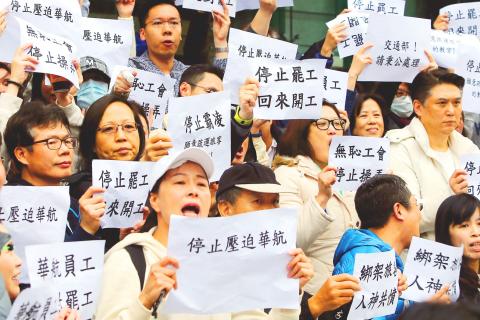About 200 China Airlines Ltd (CAL, 中華航空) employees yesterday said that they opposed the strike launched by the Taoyuan Union of Pilots, at a protest outside the Ministry of Transportation and Communications in Taipei.
Protesters also questioned the role of union chairwoman Lee Hsin-yen (李信燕), who is an EVA Airways Corp (長榮航空) pilot, saying that she should withdraw from negotiations with airline management, as it involves confidential information.
“I was elected through legal procedures to be the chairwoman of the union, which represents CAL and EVA pilots,” Lee said.

Photo: CNA
“I am simply fulfilling my responsibility as the chairwoman, which is to represent its members,” she said.
The employees who protested did so voluntarily and did not receive any instructions from company management, CAL manager Lee Ching-ting (李晶婷) said.
“The union, on the other hand, searched the Internet to identify pilots who defied its order to go on strike. It should stop cyberbullying and face the public honestly instead,” she said.
Ground staff have been working extra hours to help passengers change their tickets, and many were still working yesterday, so they could not attend the protest, Lee Ching-ting said.
Some of the protestors told the Taipei Times that the pilots should be reasonable in their demands.
Pilots do not seem to realize that their demands would impose a huge financial burden on the airline, they said, adding that the strike would also cause the company to lose passengers.
After a previous strike launched by flight attendants in 2016, the company took about six months to resume normal operations, they said.
Pilots should stop the strike and start working immediately, they added.
Protesters handed a petition to Civil Aeronautics Administration Flight Standards Division Director Clark Lin (林俊良), who accepted the letter for the ministry.
China Airlines Employees’ Union president Liu Hui-tsung (劉惠宗) also attended the rally, although he was rooting for the striking pilots.
Workers should support each other, Liu said, adding that going on strike was the last resort for workers to defend themselves.
Protesters accused Liu of being shameless and using the union’s membership fees for his campaign for the Taoyuan mayoral election last year.

CHAOS: Iranians took to the streets playing celebratory music after reports of Khamenei’s death on Saturday, while mourners also gathered in Tehran yesterday Iranian Supreme Leader Ayatollah Ali Khamenei was killed in a major attack on Iran launched by Israel and the US, throwing the future of the Islamic republic into doubt and raising the risk of regional instability. Iranian state television and the state-run IRNA news agency announced the 86-year-old’s death early yesterday. US President Donald Trump said it gave Iranians their “greatest chance” to “take back” their country. The announcements came after a joint US and Israeli aerial bombardment that targeted Iranian military and governmental sites. Trump said the “heavy and pinpoint bombing” would continue through the week or as long

TRUST: The KMT said it respected the US’ timing and considerations, and hoped it would continue to honor its commitments to helping Taiwan bolster its defenses and deterrence US President Donald Trump is delaying a multibillion-dollar arms sale to Taiwan to ensure his visit to Beijing is successful, a New York Times report said. The weapons sales package has stalled in the US Department of State, the report said, citing US officials it did not identify. The White House has told agencies not to push forward ahead of Trump’s meeting with Chinese President Xi Jinping (習近平), it said. The two last month held a phone call to discuss trade and geopolitical flashpoints ahead of the summit. Xi raised the Taiwan issue and urged the US to handle arms sales to

State-run CPC Corp, Taiwan (CPC, 台灣中油) yesterday said that it had confirmed on Saturday night with its liquefied natural gas (LNG) and crude oil suppliers that shipments are proceeding as scheduled and that domestic supplies remain unaffected. The CPC yesterday announced the gasoline and diesel prices will rise by NT$0.2 and NT$0.4 per liter, respectively, starting Monday, citing Middle East tensions and blizzards in the eastern United States. CPC also iterated it has been reducing the proportion of crude oil imports from the Middle East and diversifying its supply sources in the past few years in response to geopolitical risks, expanding

Pro-democracy media tycoon Jimmy Lai’s (黎智英) fraud conviction and prison sentence were yesterday overturned by a Hong Kong court, in a surprise legal decision that comes soon after Lai was jailed for 20 years on a separate national security charge. Judges Jeremy Poon (潘兆初), Anthea Pang (彭寶琴) and Derek Pang (彭偉昌) said in the judgement that they allowed the appeal from Lai, and another defendant in the case, to proceed, as a lower court judge had “erred.” “The Court of Appeal gave them leave to appeal against their conviction, allowed their appeals, quashed the convictions and set aside the sentences,” the judges